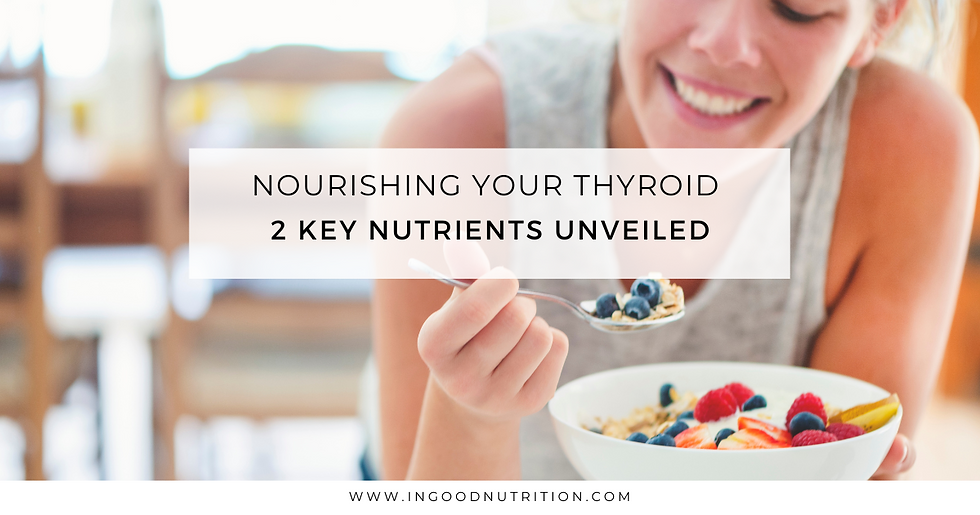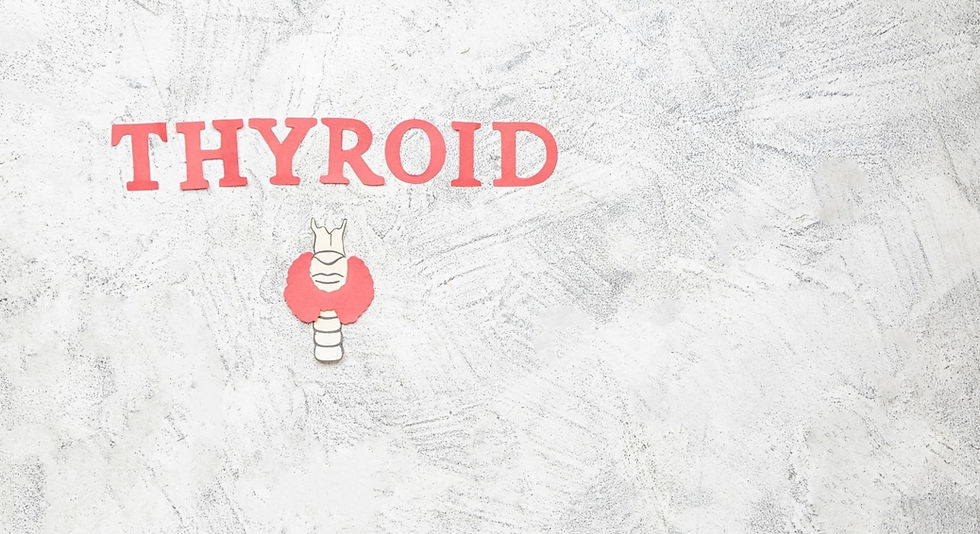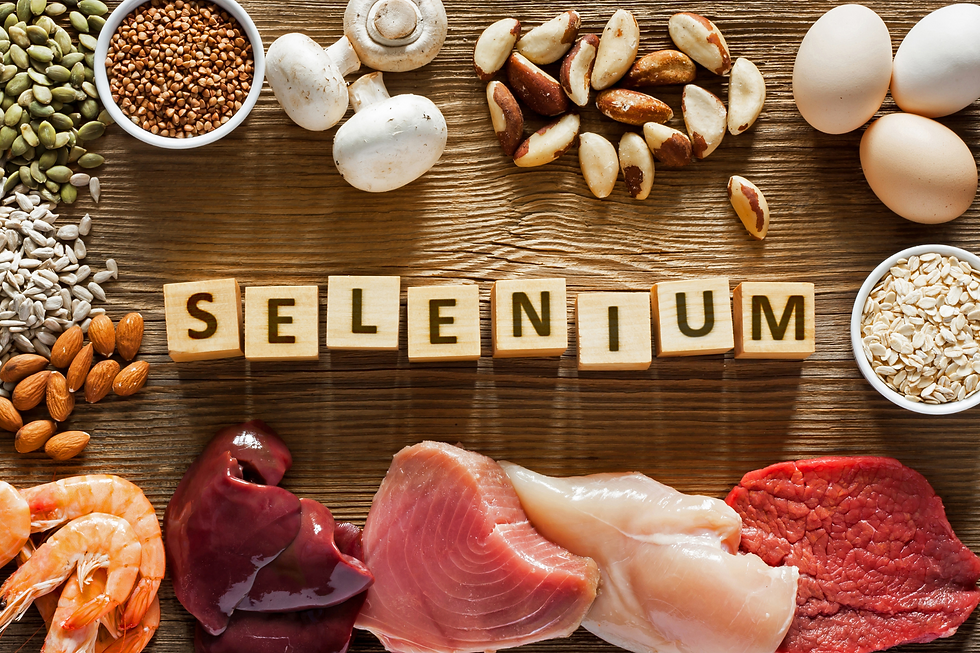Nourishing Your Thyroid: 2 Key Nutrients Unveiled
- Meredith Krayenhoff, Registered Dietitian

- Mar 29, 2024
- 4 min read
Updated: Apr 8, 2024
Written by and medically reviewed by Meredith Krayenhoff, Registered Dietitian. Published March 29, 2024.
Ever wondered about the silent superhero in your body? Meet your thyroid: small in size, but mighty in its impact on your health and vitality.
Imagine a butterfly resting just below your throat – that's your thyroid gland. Despite its small size, it plays a significant role in regulating many functions in your body. While we often think about the thyroid as managing our metabolism, its role extends far beyond simply calorie burning.

Your thyroid controls the break-down and building-up of many key organs in the body, including your heart, brain, and even digestive processes! A sluggish thyroid may result in decreased stomach acid levels, potentially leading to bacterial overgrowth in the gut and issues like constipation.
In this post, we’ll take a look at two of the nutrients that are key players in keeping your thyroid functioning optimally.
Role of selenium and zinc in thyroid function
Many of the processes that happen in our bodies consist of several chemical reactions all connected to each other. Producing thyroid hormones is no exception. Our body starts with raw ingredients, and then moves them from one step to the next, eventually coming out with the hormone that will travel throughout the body and effect change on our metabolism.
In order to make these steps occur, we often need a catalyst. Without the catalyst, all of the raw ingredients continue to sit there, doing nothing, but once the catalyst is present, then boom! The reactions start to happen.
With the thyroid, selenium acts as a catalyst that facilitates the conversion of T4, to functional T3. T4 is produced by the thyroid, but T3 is the one that travels through your bloodstream. Selenium and zinc are the catalysts in this case, that ensure T3 is made.

Dietary sources of selenium
The selenium content in foods can vary considerably, depending on the selenium levels in the soil where they were grown. Certain foods stand out as excellent sources of selenium, with Brazil nuts being a prime example.
A single Brazil nut packs a whopping 96 micrograms of selenium - enough to bring you above the minimum amount needed in a day! Incorporating 1-2 Brazil nuts into your daily routine can ensure you meet your selenium needs! If Brazil nuts aren't to your liking, you can still get sufficient selenium by regularly consuming seafood, meat, eggs, bread, and cereals.

Selenium: How much is too much?
Often our clients will ask us if they should just take a supplement of a particular nutrient “just to be sure.” With many nutrients, and minerals especially, you can have too much of a good thing.
Toxically high levels of selenium can lead to digestive upset, a metallic taste in your mouth, brittle nails and thin hair, and skin rashes. It’s safest to get selenium from food sources, as the upper limit of selenium for anyone aged 14 and up is 400 micrograms per day. In case you weren’t sure, a microgram, or µg, is 1/1000 of a milligram! So, 400 µg is less than half a mg. This is why we call it a trace mineral - for all of its importance, we only need small amounts for optimal health!
The table below shows a summary of the minimum and maximum amounts of selenium we require at different ages and stages of life.
Age | Selenium Minimum Daily Requirement (µg) | Upper Limit (ul) |
0-6 months | 15 | 45 |
7-12 months | 20 | 60 |
1-3 years | 20 | 90 |
4-8 years | 30 | 150 |
9-13 years | 40 | 280 |
14+ years | 55 | 400 |
Dietary sources of zinc
When it comes to zinc, it has its own powerhouse food: oysters! With approximately 25mg of zinc per ounce of cooked oysters, this is not a food you need to consume daily! Fortunately, our bodies can efficiently store zinc, so it's more important to maintain an adequate average intake. You can easily find canned smoked oysters in most grocery stores, typically alongside other canned fish. Try enjoying them on crackers with thinly sliced cucumber for a delicious snack. Besides oysters, many foods rich in selenium also boast high zinc content, including seafood, nuts, cereals, and dairy products.
Zinc: How much is too much?
Similar to selenium, there is such a thing as getting too much zinc in your diet. In the short term, excessive zinc intake can lead to an upset stomach, accompanied by symptoms like nausea, vomiting, headaches, and loss of appetite. Over the long term, it may negatively affect cholesterol levels and immune system. Zinc is also absorbed by the same molecules as copper, an excess of zinc could potentially result in a copper deficiency as these molecules prioritize zinc absorption. For individuals over 18 years old, the recommended maximum daily intake of zinc is 40 mg.
The Table below for a concise breakdown of the daily zinc requirements based on age and sex. Note that zinc is measured in milligrams (mg), which represents a thousand times greater quantity than the units used for selenium.
Age | Zinc Minimum Daily Requirement (mg) | Upper Limit (mg) |
0-6 months | 2 | 4 |
7-12 months | 3 | 5 |
1-3 years | 3 | 7 |
4-8 years | 5 | 12 |
9-13 years | 8 | 23 |
14+ years (men) | 11 | <18 years: 34 >18 years: 40 |
14+ years (women) | 8-9 | <18 years: 34 >18 years: 40 |
*Minimum requirements are slightly higher for pregnant and lactating women: 11-13, depending on age.
Key takeaways: Nourishing Your Thyroid
Understanding the importance of selenium and zinc in our diets sheds light on their important roles in thyroid function. By incorporating selenium-rich foods like Brazil nuts and seafood, as well as zinc-rich sources such as oysters and nuts, into our daily meals, we can fortify our nutritional intake naturally.
By staying mindful of our dietary choices and consulting with healthcare professionals when needed, we can harness the power of selenium and zinc to nourish our bodies and thrive.
Ready to optimize your thyroid health?
Book with our expert thyroid dietitians at In Good Nutrition for personalized guidance and tailored strategies. Take control of your well-being today!


